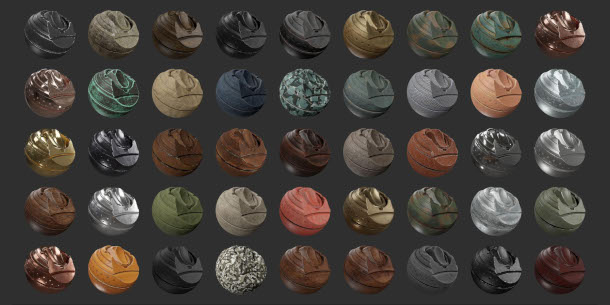Quixel ships Mixer 2020.1.6
Originally posted on 28 February 2020. Scroll down for news of the Mixer 2020.1.6 update.
Quixel has released Mixer 2020, the latest update to its free material-authoring tool, available in beta.
The release adds a new 3D painting toolset, a curvature-based system for adding procedural dirt and wear effects, new procedural masking features, and support for Smart Materials.
In the online changelog, the release is referred to as Mixer 2020.1, so take your pick of the version numbers.
A next-gen tool for creating PBR materials by blending 3D scan data
First released in 2018, Mixer began as a companion app for subscribers to Quixel’s Megascans library of 3D scan data: the original name for the software was Megascans Studio.
Over the course of the year, it evolved into a more broadly featured tool for blending 3D scan data from any source to create new materials.
The software uses a non-destructive layer-based workflow, and includes a brush-based toolset for multi-channel painting and sculpting, outputting standard texture maps at up to 32-bit resolution.
At the time of Quixel’s acquisition by Epic Games last year, Epic general manager Marc Petit told CG Channel that he saw the software as a long-term alternative to Adobe’s Substance tools.
New 3D texturing system, including 3D painting, masking and curvature effects
One major step towards that is the introduction of a new 3D painting system in Mixer 2020.
It’s officially described as “early 3D support”, but it’s still possible to import a model in OBJ or FBX format, and paint directly onto a range of material channels in the viewport, as shown in the video above.
In addition, texture layers now use Box projection by default, making it possible to reposition or rescale them over the surface of a 3D model without the need to UV unwrap it.
The update adds new masking options for 3D geometry, including a Projection Modifier and the option to use the Position Gradient mask in 3D.
There is also a new real-time curvature system, making it possible to shade or mask a model according to its surface curvature, helping to create procedural edge wear and dirt effects.
According to Quixel, subsequent releases will add other 3D texturing capabilities, including support for multiple texture sets, and mirrored UVs.
Support for Smart Materials
The release also introduces the Smart Material system from DDO, Quixel’s now-defunct Photoshop texturing plugin, into Mixer.
Textures can be exported as Smart Materils by grouping the relevant texture layers and right-clicking. The software also comes with “dozens” of readymade Smart Materials.
Other changes include a new set of 3D primitives on which materials can be previewed, supplementing the default plane. Options include a rounded cube, a sphere, “multiple cylinders” and a shader ball.

Updated 24 June 2020: Quixel has released Mixer 2020.1.2, the latest feature update to the software. (The previous release, Mixer 2020.1.1, was primarily a bugfix update.)
The update adds a new Asset Manager, with capabilities including auto-detection of missing assets when working with files created by other artists, and better handling of assets referenced multiple times in a file.
Quixel has also made 50 new Smart Materials – including metals, fabrics, rock, wood and leather – available free to all Mixer users.
Updated 14 October 2020: Quixel has released Mixer 2020.1.5, adding a further 73 Smart Materials, including arch viz materials like metal, marble, granite and fabrics.
Since we last wrote about the software, Mixer 2020.1.3 was a hotfix update, but Mixer 2020.1.4, also added 44 Smart Materials.
Updated 26 November 2020: Quixel has released Mixer 2020.1.6, adding a new Mask Export system.
The feature makes it possible to export any mask created inside Mixer to DCC applications: for example, in order to generate variants of a material in a game engine.
Users can export a mask from a single layer inside Mixer, or create a composite mask from multiple layers, previewing the result in the viewport before export.
In addition, Mixer can now run on networks behind a proxy server, making it easier to use in large studios.
The update also adds 65 new Smart Materials of weathered surfaces, including wood, metal and rubber.
Pricing and system requirements
Mixer is available free for Windows and macOS. The software is officially in beta.
All users get a selection of Smart Materials and assets from Quixel’s Megascans library available in Mixer for free; Unreal Engine users can use the entire library for free in Mixer for UE4 projects.
